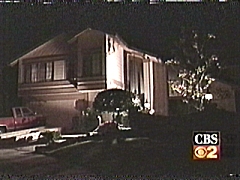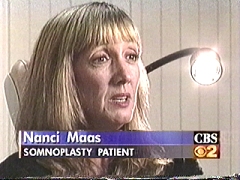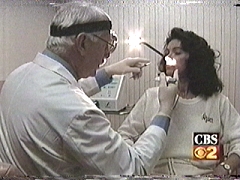 |
 |
 |
 |
| |
||||
Silent NightA CBS 2 News Special Assignment  The sounds are unbearable. The sounds are unbearable. Loud snorts and grunts can make it nearly impossible for you and the person snoring next to you to get a good night's sleep. CBS 2 News' Thelma Gutierrez shows us a new, quick procedure that might be your answer to a silent night. Special Assignment: Silent Night aired Monday, January 4, 1999 at 11 p.m. But doctors say more and more women who snore are coming forward, seeking relief for a silent night, reported CBS 2 News' Thelma Gutierrez. It's nighttime at the Seal home in Placentia. Clara and Henry Seal are getting ready for bed. Just as they close their eyes and settle in for a night of rests, something wakes them up. "I think is sounds like a wild boar because sometimes I have a grunt and I wake myself up," Clara Seal told Gutierrez. "My husband was the one who started complaining that I was snoring," Seal recalled. "In the beginning, except for that loud snort, I wasn't sure that I was doing it through the night." "If it's actually bad enough that I get out of bed and come downstairs, that's usually it -- that's the end of the sleep for the night," Henry Seal said. "It was really embarassing to me," his wife explained, "but also frightening because I wish I wasn't snoring so he could sleep. But I couldn't do anything about it." And she's not alone, reported Gutierrez. Nanci Maas snored for more than 20 years before finally going to a doctor for help. "There's nothing worse than getting up the next morning and hear your girlfriend telling your other girlfriend, 'She sounded like my ex-husband,' Maas said. "They call me the Dr. Ruth of snoring," Weissman told Gutierrez. "We do see a lot of couples and we hear a lot of interesting stories about people are reverting or resorting to sleeping in light of the situation. "I've had couples where the husband sleeps in the bathtub, on the couch, on the floor, goes out to the trailer, sleeps in the car. We've had some where the kids leave the home. It's quite disruptive to one's nighttime sleep activity," Weissman said. So Seal and Maas join the growing number of snorers to forego major surgery. They've opted for somnoplasty -- a new FDA-approved procedure that is quick, minimally invasive and nearly painless. In most cases, somnoplasty can reduce or even eliminate snoring, said Gutierrez. First, Weissman applies a local anesthetic. Then, he uses a hand-held gun to insert a needle that emits radio-frequency energy. "And by implanting a little probe into the throat, we're able to get the palatable muscles to tighten and shrink," Weissman told Gutierrez. The entire procedure takes less than 20 minutes. After several weeks passed, all was quiet at the Seal house for the first time in years, said Gutierrez. Clara Seal said the $1,800 procedure was successful. Her snoring has faded significantly, and both she and her husband are sleeping more soundly. More information:
|
|
 |
|
|
Retire Rich
 |

 |
||
|
12 p.m.
Woman 2 Woman One of the stars from "Judging Amy" 5 p.m. 6 p.m. 11 p.m.
|
||
 |
||
|
4-5 p.m.
Judge Judy Ruler Of The Free World! 8:00 p.m. 8:30 p.m.
9:00 p.m.
|
||
| |
||
 Snoring is no joke. It plagues some 40 million Americans, mostly men.
Snoring is no joke. It plagues some 40 million Americans, mostly men.  Henry Seal first tried to wake up his wife, said Gutierrez. When that didn't work, he was forced to go downstairs.
Henry Seal first tried to wake up his wife, said Gutierrez. When that didn't work, he was forced to go downstairs.  Dr. Glenn Weissman is an ear, nose and throat specialist of 18 years. He has seen hundreds of snorers in his office in San Gabriel. Nearly 40 percent of them are women.
Dr. Glenn Weissman is an ear, nose and throat specialist of 18 years. He has seen hundreds of snorers in his office in San Gabriel. Nearly 40 percent of them are women.  "It's painless because there are no cuts in the throat," Weissman explained. "It's safe and effective because there's no chance of infection, bleeding or other complications we've seen with other modalities."
"It's painless because there are no cuts in the throat," Weissman explained. "It's safe and effective because there's no chance of infection, bleeding or other complications we've seen with other modalities." 

